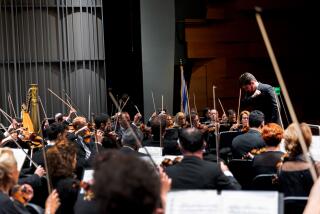Joseph Dorfman, 65; New Music Composer, Shostakovich Scholar
- Share via
Joseph Dorfman, a noted Russian-Israeli composer of new music and a Shostakovich scholar, died June 7 during a concert in Encino marking the centennial of Dmitri Shostakovich’s birth. He was 65.
Dorfman, who was also a concert pianist, collapsed in the foyer of Valley Beth Shalom temple after performing his tribute to the Russian composer. He died of what appeared to be a heart attack, said Dr. Richard A. Braun, chairman of the Jewish Music Commission of Los Angeles, which helped present the concert.
“The performance was a transforming experience for the audience, and he was absolutely radiant,” said Braun, who was standing next to Dorfman when he collapsed during intermission.
Dorfman had been scheduled to return to Israel the following morning.
Before performing, Dorfman spoke to the 350-member audience about Shostakovich’s kinship with Jewish culture. Dorfman had known the Russian master, who died in 1975.
With a cellist and a violinist from the Los Angeles Philharmonic, Dorfman then played his “Trio, In Memory of Dmitri Shostakovich,” which incorporates the same four tones that Shostakovich used as his signature in several works.
The evening performance was the last of a series of concerts Dorfman gave in Southern California during a spring sabbatical sponsored by the Center for Jewish Culture and Creativity in Los Angeles. While on leave from teaching composition and theory at Tel Aviv University’s school of music, Dorfman also lectured at the University of Judaism.
“He was a major person in the advancement of new music in Israel and throughout the world,” Braun said. “And he was a champion of Shostakovich -- not only his music but of the things he did under the most difficult of circumstances to support Jewish poets and artists who suffered under Russia’s Communist regime.”
Born in Odessa, Ukraine, Dorfman graduated from the Odessa Conservatory in 1965 and started to establish himself as a composer.
“But I wanted to write music with Jewish themes,” he told the Jerusalem Post in 1989, “and this caused trouble.”
He also wanted to earn his doctorate by studying the contemporary composer Paul Hindemith, a German who had become an American citizen. That was also problematic because the subject veered from the standard disciplines of Ukrainian and Soviet music.
In search of a more liberal atmosphere, Dorfman left for Moscow in 1966 and did his doctoral dissertation on Hindemith at the Gnessin Institute.
Once again, his affinity for weaving Jewish threads into his compositions brought him criticism.
A professor warned him to stop writing Jewish music, but Dorfman replied that he could not.
“You don’t have any future here as a composer,” Dorfman later recalled the professor telling him.
In search of musical freedom, Dorfman applied to immigrate to Israel after completing his doctorate in 1971. The Soviet establishment replied by banning his music from the country’s concert stages and radio stations.
He left for Israel in 1973 and did not see his music performed in his homeland again until 1989. Soviet leader Mikhail Gorbachev’s glasnost policies were opening up the arts, and a stunned Dorfman was invited to hear his works played in concert in five Soviet cities.
Dorfman is survived by his wife, Lily; daughter, Sonia; and two grandchildren. A memorial concert will be held at 7:30 p.m. July 5 at Valley Beth Shalom, 15739 Ventura Blvd., Encino.
More to Read
The biggest entertainment stories
Get our big stories about Hollywood, film, television, music, arts, culture and more right in your inbox as soon as they publish.
You may occasionally receive promotional content from the Los Angeles Times.











